I blow up a balloon - Study guides, Class notes & Summaries
Looking for the best study guides, study notes and summaries about I blow up a balloon? On this page you'll find 549 study documents about I blow up a balloon.
Page 4 out of 549 results
Sort by
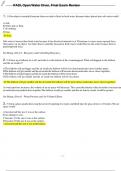
-
PADI, Open Water Diver, Final Exam Review
- Exam (elaborations) • 28 pages • 2024
-
Available in package deal
-
- $10.00
- + learn more
1) If an object is neutrally buoyant (does not sink or float) in fresh water, the same object placed into salt water would A sink. B either sink or float. C do nothing. D float. - D 2) I blow up a balloon, tie it off, and take it to the bottom of the swimming pool. What will happen to the balloon and the air inside it? A The balloon will get bigger and the air inside the balloon will be less dense (molecules move further apart). B The balloon will get smaller and the air inside the balloon will ...
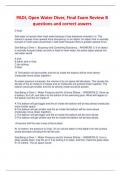
-
PADI, Open Water Diver, Final Exam Review B questions and correct aswers
- Exam (elaborations) • 20 pages • 2024
- Available in package deal
-
- $15.49
- + learn more
PADI, Open Water Diver, Final Exam Review B questions and correct aswers D float. Salt water is heavier than fresh water because it has dissolved minerals in it. This means it causes more upward force (buoyancy) on an object. An object that is neutrally buoyant in fresh water would float in salt water because there is greater upward force. See Being a Diver I - Buoyancy and Controlling Buoyancy. - ANSWERS 1) If an object is neutrally buoyant (does not sink or float) in fresh water, t...
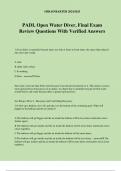
-
PADI, Open Water Diver, Final Exam Review Questions With Verified Answers
- Exam (elaborations) • 27 pages • 2024
-
- $11.49
- + learn more
PADI, Open Water Diver, Final Exam Review Questions With Verified Answers 1) If an object is neutrally buoyant (does not sink or float) in fresh water, the same object placed into salt water would A sink. B either sink or float. C do nothing. D float. - answerD float. Salt water is heavier than fresh water because it has dissolved minerals in it. This means it causes more upward force (buoyancy) on an object. An object that is neutrally buoyant in fresh water would float in salt water ...
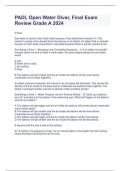
-
PADI, Open Water Diver, Final Exam Review Grade A 2024
- Exam (elaborations) • 20 pages • 2024
-
- $11.49
- + learn more
D float. Salt water is heavier than fresh water because it has dissolved minerals in it. This means it causes more upward force (buoyancy) on an object. An object that is neutrally buoyant in fresh water would float in salt water because there is greater upward force. See Being a Diver I - Buoyancy and Controlling Buoyancy. - 1) If an object is neutrally buoyant (does not sink or float) in fresh water, the same object placed into salt water would A sink. B either sink or float. C do ...
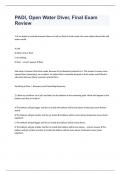
-
PADI, Open Water Diver Review Practice Questions 2024.
- Exam (elaborations) • 27 pages • 2024
-
Available in package deal
-
- $13.49
- + learn more
PADI, Open Water Diver Review Practice Questions 2024.1) If an object is neutrally buoyant (does not sink or float) in fresh water, the same object placed into salt water would A sink. B either sink or float. C do nothing. D float. - correct answer D float. Salt water is heavier than fresh water because it has dissolved minerals in it. This means it causes more upward force (buoyancy) on an object. An object that is neutrally buoyant in fresh water would float in salt water because ther...
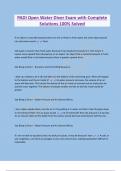
-
PADI Open Water Diver Exam with Complete Solutions 100% Solved
- Exam (elaborations) • 13 pages • 2024
- Available in package deal
-
- $13.99
- + learn more
PADI Open Water Diver Exam with Complete Solutions 100% Solved If an object is neutrally buoyant (does not sink or float) in fresh water, the same object placed into salt water would Float Salt water is heavier than fresh water because it has dissolved minerals in it. This means it causes more upward force (buoyancy) on an object. An object that is neutrally buoyant in fresh water would float in salt water because there is greater upward force. See Being a Diver I - Buoyancy and Contr...
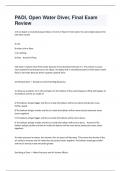
-
PADI, Open Water Diver, Final Exam Review with 100% Correct Answers 2024
- Exam (elaborations) • 25 pages • 2024
- Available in package deal
-
- $7.99
- + learn more
1) If an object is neutrally buoyant (does not sink or float) in fresh water, the same object placed into salt water would A sink. B either sink or float. C do nothing. D float. - Answer-D float. Salt water is heavier than fresh water because it has dissolved minerals in it. This means it causes more upward force (buoyancy) on an object. An object that is neutrally buoyant in fresh water would float in salt water because there is greater upward force. See Being a Diver I - Buoyancy and ...
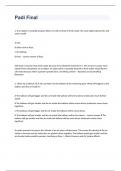
-
PADI FINAL EXAM 2024.
- Exam (elaborations) • 23 pages • 2024
-
Available in package deal
-
- $11.99
- + learn more
PADI FINAL EXAM 2024. 1: If an object is neutrally buoyant (does not sink or float) in fresh water, the same object placed into salt water would A sink. B either sink or float. C do nothing. D float. - correct answer D float. Salt water is heavier than fresh water because it has dissolved minerals in it. This means it causes more upward force (buoyancy) on an object. An object that is neutrally buoyant in fresh water would float in salt water because there is greater upward force. See ...
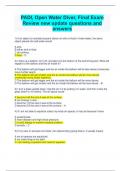
-
PADI, Open Water Diver, Final Exam Review new update questions and answers
- Exam (elaborations) • 13 pages • 2024
-
- $10.49
- + learn more
1) If an object is neutrally buoyant (does not sink or float) in fresh water, the same object placed into salt water would A sink. B either sink or float. C do nothing. D float. - D 2) I blow up a balloon, tie it off, and take it to the bottom of the swimming pool. What will happen to the balloon and the air inside it? A The balloon will get bigger and the air inside the balloon will be less dense (molecules move further apart). B The balloon will get smaller and the air inside the bal...
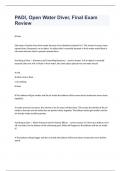
-
PADI, Open Water Diver, Final Exam Questions & Answers 2024.
- Exam (elaborations) • 27 pages • 2024
-
Available in package deal
-
- $11.99
- + learn more
PADI, Open Water Diver, Final Exam Questions & Answers 2024. D float. Salt water is heavier than fresh water because it has dissolved minerals in it. This means it causes more upward force (buoyancy) on an object. An object that is neutrally buoyant in fresh water would float in salt water because there is greater upward force. See Being a Diver I - Buoyancy and Controlling Buoyancy. - correct answer 1) If an object is neutrally buoyant (does not sink or float) in fresh water, the same o...

How much did you already spend on Stuvia? Imagine there are plenty more of you out there paying for study notes, but this time YOU are the seller. Ka-ching! Discover all about earning on Stuvia


